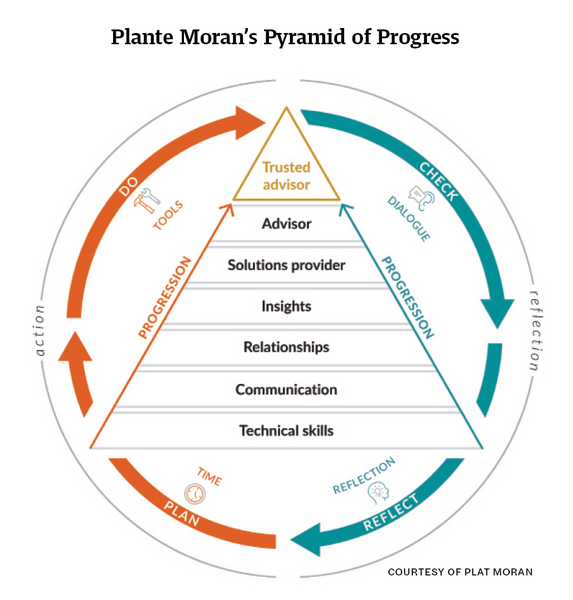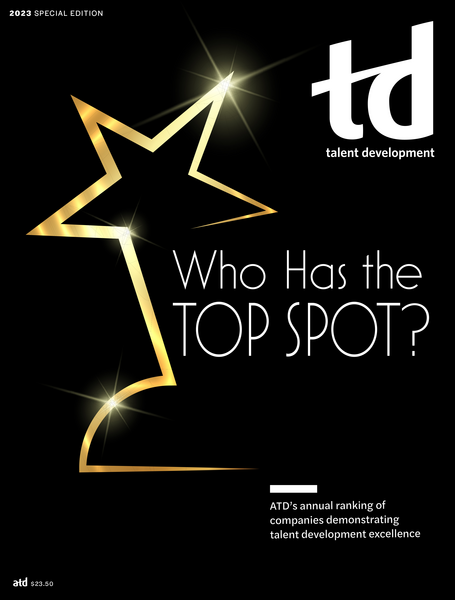TD Magazine Article
Career Pathways Move Staff Forward
Enabling employees to grow and succeed is a hallmark of these companies.
Thu Jun 15 2023

The BEST Awards recognize organizations that demonstrate enterprise-wide success as a result of employee talent development. The winners use learning as a strategic business tool to get results. View the entire list of 2023 BEST Award winners.
Enabling employees to grow and succeed is a hallmark of these companies.
"We place such a high value on talent development that providing our talented staff with the skills necessary to be successful in our rapidly changing business environment is a key component of the firmwide strategic plan," states Jim Proppe, managing director at Plante Moran, a financial services firm in the US.
That is a sentiment shared by leaders of BEST Award-winning companies around the world. Talent development is a differentiator for organizations when it is strategic, holistic, relevant, and aligned to organizational goals and objectives. One-size training can't fit all for companies that are committed to creating environments where employees thrive.
Nurture and grow
The financial services sector is highly competitive. Not only are businesses competing for clients; they are also competing for talent.
For China-based GF Securities, a shortage of talent for its management pipeline led the talent development team to tackle the problem from two angles. It created a "reserve management" program in which the company selected and nurtured younger employees in key skills required for management positions. The company gave the associates a leadership assessment and experience audit. They also had interviews with executives. Two fast development plans—one for senior leaders and another for frontline managers—help program participants see what different levels of leadership require. The program has led to a pipeline that is 1.5 times greater for key management roles.
GF Securities also created a job rotation program that gave this reserve talent pool exposure to different departments; work in branches and at headquarters; as well as roles with the parent company and subsidiaries, government agencies, and benchmark enterprises. "The rotation allowed for a rapid accumulation of experiences and gave participants keen insights," according to the company. More than 80 percent of the young management personnel promoted in the past three years have been those whom the company has mentored.
The mentoring program at SWBC, a financial services company based in San Antonio, Texas, matches learners in different divisions and guides them as they support each other in learning about products and services in tandem with building confidence, business acumen, and communication skills. The initiative is future focused, advances employee skill sets, encourages innovation, minimizes fear of failure, and promotes adaptation—all crucial factors in the company's success.
The program has proven to be sustainable, graduating 184 pairs of mentors and mentees since its inception and generating 71 promotions. Graduates report that the relationships established in the program extend well beyond the initiative's 10 months. More than half of the mentors return for multiple years.
Standing out
Another SWBC development program is Emerging Professionals, which engages early-career professionals to help increase brand and product awareness, enhance recruitment efforts, and represent SWBC in community events. The group, comprised of staff with less than 15 years of work experience, serves as a think tank, offering creative ideas and solutions while providing a fresh perspective on products, services, and processes.
Participants select one of three committees to serve on: brand awareness, community involvement, or recruiting and retention. Participants choose projects to complete and have autonomy over how to meet their goals.
Community involvement is integral to SWBC's employee value proposition. By integrating corporate social responsibility into learning events, the company achieves a win for the community, the learner, and itself. Graduates stay engaged by serving as advisors to current participants. Of the 88 graduates, 57 have received promotions.
Progress, progress, progress
Plante Moran's TD team supports the organization's talent strategy with the Pyramid of Progress, a framework that illustrates the core belief that all staff have the opportunity and should strive to become trusted advisors to their clients—whether external or internal—by a focused progression of competency development. The model is in the shape of a one-dimensional pyramid, with seven layers ranging from technical skills to trusted advisor (see figure).

Technical skills form the base of the pyramid and are the foundation of professional service. To become a trusted advisor, however, employees need effective communication and relationship-building skills, creative problem solving, and the ability to provide unique insights. With practice, the culmination of those skills often leads to acquiring Plante Moran's trusted advisor status (the pinnacle).
Recruiting efforts focus on obtaining technically competent candidates who will serve as trusted advisors to clients and enhance company culture. The team's behavior-based interview process is designed to measure a candidate's ability to grow and succeed in the organization as much as their professional competencies. From campus recruiting efforts to a "build versus buy" internship model to recruiting experienced professionals and leveraging pre-employment testing, Plante Moran has found that its approach is an accurate predictor of long-term success, viability, and satisfaction. The company also offers referral bonuses to staff, recognizing that "like knows like" and internal referrals are best when it comes to finding good staff.
The Trusted Advisor Program is the company's leadership development program, named and designed to link to the staff development model. Coursework offered in the curriculum is based on universal, nontechnical competency development in areas such as communication, staff development, leadership, critical thinking, and business development. The Trusted Advisor Program is similar to collegiate general education requirements, providing a foundation of broad business skill development regardless of practice or specialty. Attendance in the program is staged to align with staff member roles.
Tooling around
Deep, sustained, and individualized career-long learning is also a characteristic of Black Knight's approach to talent development. With the organization's shift to a fully hybrid work model, Black Knight has placed significant emphasis on making sure digital tools keep up with learning demand. The company has reimagined all former in-person instructor-led training courses as virtual learning experiences. That necessitates digital skill adoption across the workforce.
To facilitate that, the learning and leadership development team educated employees on two cloud platforms. The company offers more than 9,000 e-learning courses, 504 interactive labs, 100 instructor-led-training certification preparation courses, 70 boot camps, as well as certification testing.
Black Knight values certification for its team members. As such, the learning and leadership development team rolled out a certification challenge that entails completing a certification prep course and practice test through the LMS. Upon completion, participants earn a free certification voucher to take the exam. When the challenge launched, the team received 812 responses; 527 employees ultimately took the challenge.
Another challenge the learning and leadership development team introduced focused on technical training. An interactive approach, the challenge consisted of teams of three to five employees tasked with supporting and improving troubled application architecture. Teams received scores based on how they handled unexpected events and ensured they built a scalable application. The event involved 16 teams and 87 total participants. Ninety-two percent of employees rated the program 4.9 on a 5-point scale, and the company was able to actualize solutions brought forth from the challenge.

